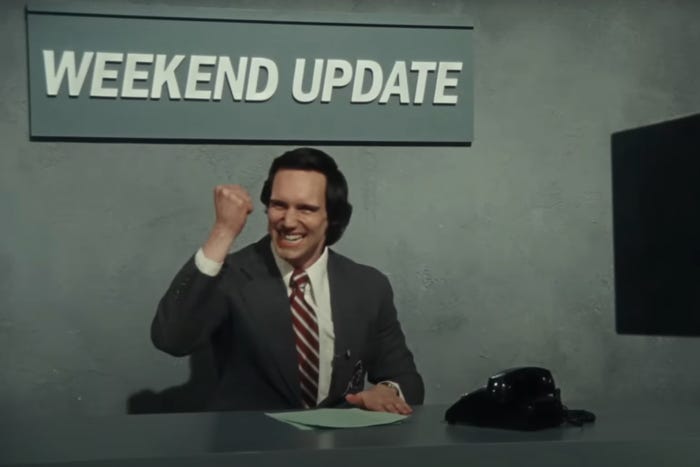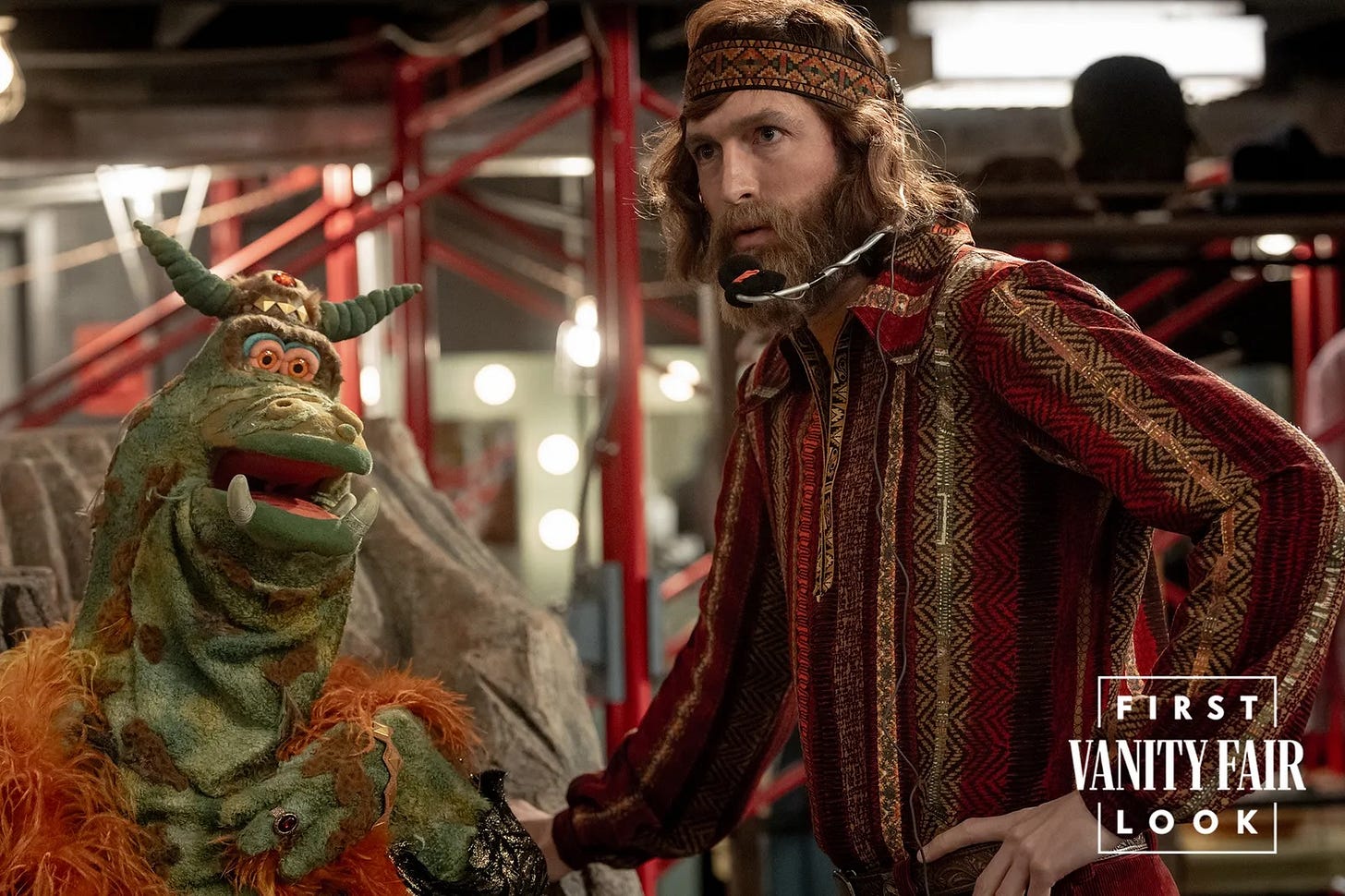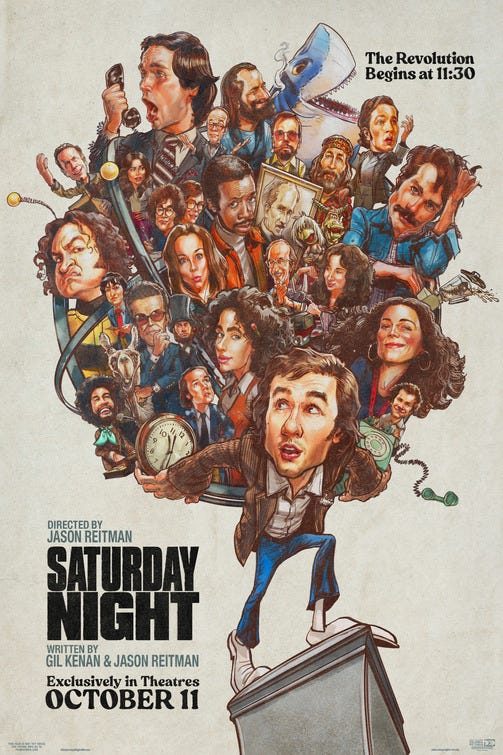Jason Reitman's Fawning Saturday Night Treats Its Subject With a Level of Deference That Would Humiliate Studio 60 on Sunset Strip
It never stops reminding audiences how hilarious and hip it is without ever being particularly funny or hip.
In a blog post about Every Episode Ever, the Herculean/cursed project where I set out to watch and write about every episode of Saturday Night Live in honor of its fiftieth anniversary on October 11th, 2025, appropriately entitled “I Feel Every Kind of Way About Saturday Night Live” I wrote, “I feel every kind of way about Saturday Night Live because the show has been just about everything. It’s been great. It’s been terrible. It’s been fresh and new and young. It’s been old and exhausted and tired.”
I have complicated, contradictory feelings about Saturday Night Live, but I obviously would not have vowed to cover it in its entirety if I had not had a deep, enduring love for Lorne Michaels’ deathless brainchild.
It quickly became evident, however, that I did not have the time, energy, bandwidth, money, or audience to watch and write about every Saturday Night Live episode and write anywhere from two to seven books about the show. There are nearly one thousand episodes of Saturday Night Live, which is also the longest show on television, with each episode running 90 minutes, or the length of a movie. To be brutally honest, some of those episodes are sub-par.
I had to choose between writing We’ve Got a Great Show For You Tonight, a book about the 50 best episodes, and We’ve Got a Terrible Show For You Tonight, an epic takedown of the 50 worst and weirdest episodes and hosts.
It was not a difficult decision. I chose to write We’ve Got a Terrible Show For You Tonight because it’s more fun to eviscerate the historically terrible than to wax earnest about comic greatness.
It’s more enjoyable to mock Lorne Michaels than to celebrate him, a point Saturday Night accidentally makes.
30 Rock was a wildly influential hit that changed television comedy because it centered on a show that was like Saturday Night Live but even stupider and hackier. Studio 60 on the Sunset Strip became a boondoggle of historic proportions because it centered on a show that was like Saturday Night Live but even more historic, important, and great.
30 Rock dealt in irreverence; Studio 60 in reverence. The first approach proved infinitely wiser than the second.
Nepo baby Jason Reitman, whose daddy directed Ghostbusters, Meatballs, and Stripes, has forgotten the lessons of 30 Rock and Studio 60 on the Sunset Strip in co-writing and directing Saturday Night, a wildly fictionalized account of Saturday Night Live’s debut episode.
The misguided screenwriter and director chronicles the first episode of Saturday Night Live with a reverence and deference that would embarrass Studio 60 on the Sunset Strip.
In Saturday Night, Michaels is the Irving Thalberg of comedy, a preternaturally efficient diminutive Jewish prodigy with a unique gift for navigating the tricky waters of show business and handling mercurial artists.
Reitman set out to make a movie about what it sees as the three most important hours of the 1970s in the style of a gritty, innovative New Hollywood provocation. The film looks fantastic. It was shot on 16MM and uses jittery handheld cameras for a documentary/cinema verite feel.
It’s a manic exercise in shameless hagiography that is forever flitting between characters and scenes. It is driven by a percussive-heavy score that’s the musical equivalent of a nervous system wired on cocaine and adrenaline.
Saturday Night chronicles the impossibly dramatic ninety minutes leading to the comic institution’s first episode. It focuses on Lorne Michaels (Gabriel LaBelle) as he puts out fires and handles crises as he prepares for the biggest night of his life.
He’s alternately hindered and assisted by intense executive David Tebet (William Dafoe). Depending on the needs of individual scenes, the television veteran is either Michaels’ biggest enemy, a skeptic with the audacity to doubt his vision, or his biggest champion, a true believer with faith in him and his abilities.
That’s similarly true of Michaels’ relationship with head writer Michael O’Donoghue (Tommy Dewey), who communicates exclusively through erudite wisecracks. If something won’t end up in a book of famous quips, it’s unworthy of coming out of his mouth.
In hack biopic tradition, all of the characters here behave precisely like their personas, only more so. Also, in hack biopic tradition, real life, no matter how dramatic or exciting, isn’t dramatic or exciting enough, so they throw in a lot of made-up bullshit. When given a choice between history and the legend, Reitman invariably chooses the legend.
To make Michaels seem even braver and more innovative, it turns Milton Berle and Johnny Carson into cartoonish villains who aren’t too pleased about Lorne Michaels, instantly making them irrelevant with his revolutionary, society-saving satire. Berle was already an irrelevant dinosaur, but Carson was at the height of his fame and power and consequently not terribly threatened by the kid with the impossible-seeming live sketch show.
A movie like this does not need any villains. It doesn’t need bad guys. The reality has enough tension and conflict. That’s not enough for the film, however, which feels the need to inject bonus conflict and bonus tension in self-defeating ways.
The script is full of backward-thinking old fogies who can’t dig what Lorne Michaels is putting down and are ignorant enough to challenge him and his revolutionary creative vision.
It’s not enough for there to be tension between cocky alpha males Chevy Chase and John Belushi; that conflict needs to be physical even though, in real life, Chase famously fought Bill Murray (who, it should be noted, is a different person than John Belushi) much later but Reitman is more concerned with cheap drama than staying true to the historical record.
Dynamics that played out over a series of years in real life happen in mere minutes here. Chevy Chase was indeed seen by many as Johnny Carson’s heir after he emerged as the breakout star of the hip, much buzzed about show’s first season.
Chase was a handsome goy with a level of cockiness that could only be the product of deep insecurity. In Saturday Night, all Chase, who isn’t even made “Weekend Update” anchor until about shortly before the show aired, has to do to be anointed the next Johnny Carson is amuse the hillbilly representative of NBC affiliates for a few minutes.
Saturday Night is more respectful of John Belushi than the notorious, reviled biopic Wired, but not by much. He’s still a drugged-up man-baby who needs to be coddled and cajoled into fulfilling his professional obligations.
Poor, heroic, God-like Lorne Michaels must put up with the coked-up jackassery of George Carlin, who is profane, belligerent, coked to the gills, and filled with rage over being asked to perform in sketches.
Its portrayal of Jim Henson is even less respectful. The filmmakers stop just short of giving Jim Henson a pocket protector and Coke bottle glasses to drive home that the beloved martyr who single-handedly made the world a better, more joyful place was a total nerd who did not understand the revolutionary, avant-garde brilliance of LORNE FUCKING MICHAELS.
Oh well. It’s not like people feel passionately about Jim Henson and are protective of his image. He might be an important cultural figure, but how can he possibly compare to someone like Michaels?
It’s unfortunate that the filmmakers felt the need to tear George Carlin and Jim Henson down to build Lorne Michaels up.
I love Jane Curtin, but I’m not sure why the actress playing her has more screen time than the actresses playing Laraine Newman and Gilda Radner combined. Lamorne Morris is terrific as Garrett Morris, even if all of his dialogue is so on the nose that he might as well begin every sentence with, “As a black man under-utilized by this show...”
Then again, you wouldn’t want to give Radner too much credit, or any credit, really, for the show’s early brilliance when it can all be attributed to the boss.
Even at the beginning of his career, Michaels possessed an aristocratic pragmatism that set him apart from his raggedy and raw cast and crew. He wasn’t much older than the Not Ready For Prime Time Players, but he nevertheless seemed like a grown-up that other grown-ups could trust, even if there appeared to be no method to his madness.
What fascinates me about Michaels is not his ambition and audacity at the beginning of his career but rather his creative and emotional corruption. I’m fascinated by how quickly he went from anti-establishment to personifying the comedy establishment. That’s a riveting story that’s not even hinted at here, despite the film’s love of clumsy foreshadowing.
Billy Crystal, for example, would famously get cut from the first episode, so the actor playing him spends much of his time onscreen worrying about getting cut from the final show.
I wouldn’t have found Saturday Night Live’s depiction of Michaels to be the greatest thing to happen to American comedy since Mark Twain started giving speeches to pay off his enormous debt if I had not watched and written about the 2015 episode of Saturday Night Live hosted by Donald Trump.
Having just experienced the twenty-one-time Emmy winner’s historic act of cowardice and capitulation, I was the worst possible audience for a film positing him as a fearless comic revolutionary.
Just after 9/11, I flew to New York for the surprise 30th birthday party of an editor of The Onion. I was in the Onion offices when the writers were still reeling from the terrorist attacks and wrestling with how to address them satirically in a manner that would be healing and respectful rather than crass and disrespectful.
Granted, I had nothing to do with that issue or the comedy side at all, but I was there. So I know firsthand what it’s like when neurotic comedy writers create something important, historic, and great. It doesn’t feel a goddamn thing like Saturday Night or Studio 60 on the Sunset Strip.
Saturday Night is a work of rampaging phoniness and brash artificiality. It’s a movie that never stops reminding audiences how hip and hilarious it is without ever being particularly hip or funny.
It even comes with its own laugh track. Reitman and co-screenwriter Gil Keenan (the monsters behind that godawful recent Ghostbusters movie) are considerate enough to let us know that what we’re seeing is guffaw-inducing by having its characters constantly chortle with glee at every over-written one-liner and wisecrack. That is when they’re not smoking doobies and snorting cocaine like total outlaw badasses.
Reitman set out to make a movie about Saturday Night Live as edgy, brilliant, and daring as Andy Kaufman in his radiant, God-like prime. Instead, he made something cornier than Billy Crystal doing his jazzman character.
Can you dig it? I knew that you could!
One Star out of Five

















This and Ghostbusters seems to prove something pretty specific about Jason Reitman: he loves funny things, but is not a funny person, and knows nothing about why things are funny in the first place.
Norm Macdonald, god rest his soul, would have torn this movie to shreds.
Fromtheyardtothearthouse.substack.com
After reading this review, I want Saturday Night, but with the Weird Al biopic treatment.